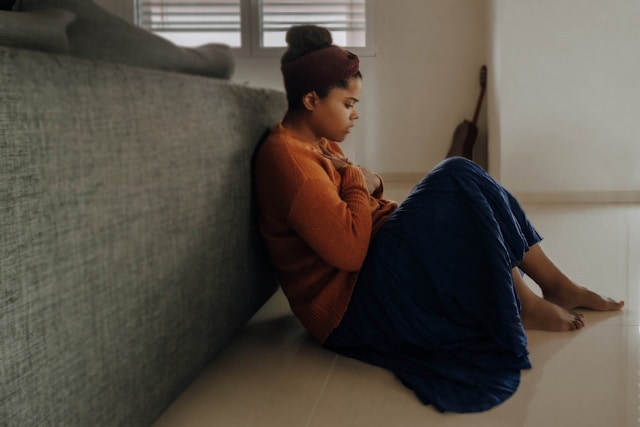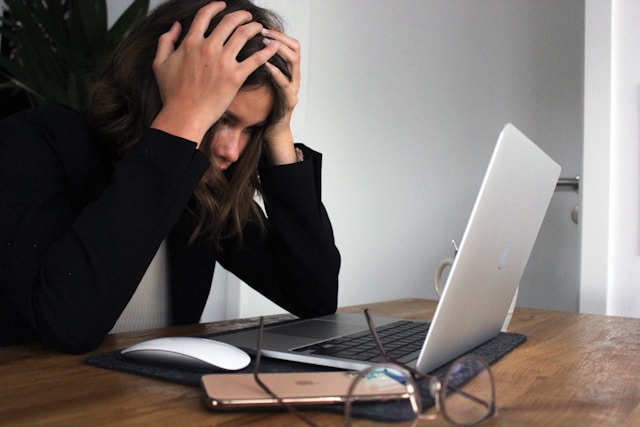It builds and that’s the strange thing, because you don’t always feel it as it comes on like a wave. It just…collects. One thing adds to the next but you shake off a bad day, then another. At some point, without a clear reason, the unease doesn’t leave. You lie down, but your body doesn’t agree that it’s bedtime. Maybe that’s when you start wondering if stress is turning into anxiety. At that point, healing and growth become harder, but there are things you can do.
THE SLOW BURN OF STRESS
Stress is part of the deal. It helps when you’re on a deadline or need to move quickly. You stay alert and you focus. It makes sense while things are happening.
Then you’re supposed to recover, except sometimes, you don’t. You might not even know what’s missing. You go about your day, but your body keeps checking for danger. Your thoughts stay sharp, but not in a good way. They buzz, they loop.
ANXIETY FEELS DIFFERENT
Anxiety doesn’t wait for something to happen. It shows up early, it speaks in maybes. What if this? What if that? Your stomach feels weird and you can’t relax. Nothing actually happened, but you’re already reacting.
Stress usually leaves when the problem does but anxiety hangs around long after. That’s the line. It’s a soft one, though.
EARLY SIGNS OFTEN SLIP PAST
It doesn’t always start with a breakdown. A lot of times, it’s subtle, like having a shorter fuse or a skipped meal, a tight jaw. You don’t feel “bad,” but you don’t feel right either.

Learn to recognize warnings on time, before they get out of hand.
That’s when it helps to ask: Is this regular pressure? Or something else? When stress is turning into anxiety, your body tells you, but in ways you might not catch at first.
Your Rest Stops Working
You used to take a walk or scroll through your phone to decompress. Now? That tension sticks around. It lives in your shoulders or your gut. Even sleep doesn’t shake it.
Worry Creeps into Everything
Little concerns balloon. You text someone, but they don’t answer, and now you’re spiralling. You make a small mistake, and suddenly you’re thinking about losing your job. If the fear grows fast and wide, that’s worth noting.
Symptoms Show Up When It’s Quiet
You’re not arguing and you’re not late. Nothing’s wrong, but your chest feels tight or your breath feels short. That’s one of the moments people often miss and you might chalk it up to something else.
This is why learning to recognize the difference between short-term stress and something else is important. Shortness of breath from anxiety often comes suddenly during emotional stress, improves with calming techniques, and doesn’t worsen with physical activity. On the other hand, breathing issues from medical causes tend to persist, worsen with exertion, or accompany more serious symptoms (like chest pain or bluish lips), so medical evaluation is needed when those signs appear.
You Start Saying “I’m Just Tired” a Lot
We all get tired. But when exhaustion feels heavier than it should, when you’re not doing that much but still feel drained, it could be emotional, not physical, and you wake up worn out.

If work is stressing you out, try to address the specific stressors before they affect your personal life.
You cancel things and you pull back from people, not always because you want to, but just because you can’t imagine putting on your “okay” face one more time.
Reacting Bigger Than Usual
You drop something and curse louder than the moment deserves. Someone takes a second too long to respond, and you feel rejected. These aren’t random, your system’s running hot and every little thing feels like more.
WHAT HELPS?
This isn’t about solving it in one mental health day, it’s about noticing sooner, acting softer, and giving yourself room to change direction before things go deeper.
Slow breath in, then slower breath out. Count it if you need to for four: hold for four, out for six, then repeat. It sounds like nothing, but it works.
Move in Small Ways
You don’t need a plan, just stand up and walk to the end of the room. Shake out your arms or change your position. Movement tells your body that it is not stuck.
Track What Shows Up
Keep a scrap of paper, even if you think self-help isn’t helping. Jot down what you’re feeling when symptoms show up. It may not be every day, just when things feel off. After a week, look for patterns. Morning tension? Night thoughts? That’s something to work with.
Let One Person Know
It doesn’t need to be deep. “I haven’t been feeling great” is enough. Speak the sentence out loud and it may breaksthe loop in your head.
If It Stays, Get Support
You don’t need to hit bottom. If what used to help doesn’t help anymore, talk to someone who knows how to listen: a therapist, a counsellor, even a doctor who gets it. There’s no gold star for waiting too long.
TRAVEL MAKES IT TRICKIER
You expect some stress when you’re moving around. Delayed trains, noisy hostels, language gap, that part is built in. But if you’ve been on edge for days, even when nothing’s wrong, it may not be the city, the food, or sleep. It may be that you are carrying the pressure, not just encountering it and that’s okay, it happens.
When you travel, it’s easy to skip meals or miss routines, forgetting to rest, that stuff adds up. If you’re trying to figure out why things feel harder, check there first.
Pack routines if you can, like a playlist or a notebook, something small that grounds you. Don’t try to “push through” if your body is asking you to pause.
DON’T WAIT FOR A BIG CRASH
People think anxiety has to show up with panic attacks or breakdowns, but it doesn’t, it shows up in skipped meals, muted joy, and short fuses. That’s how you know stress is turning into anxiety; the edges blur, and you stop feeling like yourself.
You don’t need to fall apart to earn support. If you’re asking whether something’s wrong, that’s a good enough reason to check in and listen early and rest often. Don’t talk yourself out of care because it’s not a weakness, it’s wisdom.